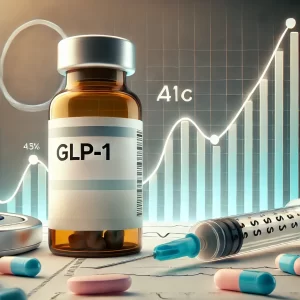Introduction Losing weight isn’t just about diet and exercise—it’s also about understanding your body and using the right tools to support your journey. Thanks to recent advances, there are now medications, peptides, and supplements that can help make weight loss more effective and sustainable. In this post, we’ll break down how GLP-1 medications like semaglutide, …
Introduction
Losing weight isn’t just about diet and exercise—it’s also about understanding your body and using the right tools to support your journey. Thanks to recent advances, there are now medications, peptides, and supplements that can help make weight loss more effective and sustainable. In this post, we’ll break down how GLP-1 medications like semaglutide, tirzepatide, and retatrutide work, explore peptides like sermorelin and BPC-157, and discuss supplements like carnitine, Lipo Mino Mix, MIC, and Vitamin B12. Let’s dive in!

Table of Contents
Weight loss Tips
Losing weight effectively requires a combination of lifestyle changes and, in some cases, medical intervention. Here are key strategies to promote healthy and sustainable weight loss:
Prioritize Protein Intake: High-protein diets help preserve muscle mass while promoting fat loss.
Eat Whole, Nutrient-Dense Foods: Focus on vegetables, lean proteins, whole grains, and healthy fats to support metabolism.
Practice Portion Control: Eating smaller meals and avoiding overeating can help regulate calorie intake.
Increase Physical Activity: Combining strength training with cardiovascular exercises enhances fat burning and muscle retention.
Stay Hydrated: Drinking plenty of water can aid digestion and control hunger.
Manage Stress and Sleep: Chronic stress and poor sleep can lead to weight gain by disrupting hormonal balance.
Limit Processed Foods and Sugars: Reducing high-calorie, low-nutrient foods helps maintain a healthy weight.
Choosing the Right Weight Loss Approach
Finding the right weight loss strategy depends on individual health conditions, goals, and preferences. Consulting with a healthcare professional can help determine the best combination of lifestyle changes and medical interventions for sustainable results.
.
GLP-1 Medications: Game Changers in Weight Loss
GLP-1 receptor agonists have transformed the way we approach weight loss. These drugs help control appetite and blood sugar, making it easier to stay on track.
GLP-1 (Glucagon-Like Peptide-1) receptor agonists are a class of medications originally developed to treat type 2 diabetes. These drugs mimic the action of the GLP-1 hormone, which plays a crucial role in regulating blood sugar levels, insulin secretion, and appetite.

How Do GLP-1 Medications Work?
GLP-1 receptor agonists work by:
Stimulating insulin release when blood sugar levels are high
Reducing glucagon secretion, which lowers blood sugar
Slowing gastric emptying, leading to prolonged feelings of fullness
Affecting brain receptors to reduce appetite
Common GLP-1 Medications
Some of the most commonly prescribed GLP-1 medications include:
Semaglutide (Ozempic, Wegovy, Rybelsus)
Liraglutide (Victoza, Saxenda)
Dulaglutide (Trulicity)
Exenatide (Byetta, Bydureon)
Tirzepatide (Mounjaro) (a dual GIP/GLP-1 receptor agonist)
GLP-1 Medication Administration
GLP-1 medications can be administered in different ways, depending on the drug:
Injectable forms (e.g., Ozempic, Trulicity, Victoza) are given subcutaneously, typically once weekly or daily, depending on the prescription.
Oral form (Rybelsus) is taken as a daily pill, preferably on an empty stomach with a small amount of water.
Proper storage and injection site rotation (for injectables) are important to ensure effectiveness and minimize irritation.
Retatrutide (The Next Big Thing?)
Why People Are Excited: Works on multiple pathways for even greater weight loss potential.
What to Watch For: Some heart rate changes and digestive issues are being studied.
Current Status: Still in trials, but showing promising results.
Side Effects and Considerations
While GLP-1 medications are generally well-tolerated, they may cause side effects, including:
Nausea, vomiting, and diarrhea (most common)
Decreased appetite
Constipation
Possible pancreatitis risk (rare but serious)
Diet Considerations While on GLP-1 Medications
Following a balanced diet can enhance the effects of GLP-1 medications and minimize side effects:
Eat smaller, frequent meals to help with slowed gastric emptying and reduce nausea.
Choose high-protein foods (lean meats, fish, eggs, tofu) to maintain muscle mass and support weight loss.
Increase fiber intake (vegetables, whole grains, legumes) to aid digestion and promote satiety.
Stay hydrated to prevent dehydration, especially if experiencing nausea or diarrhea.
Limit processed foods and high-sugar foods, which can cause blood sugar spikes and digestive discomfort.
Monitor alcohol intake, as it may worsen side effects and impact blood sugar regulation.

GLP-1 receptor agonists represent a revolutionary step in managing type 2 diabetes and obesity. They not only improve blood sugar control but also aid in sustainable weight loss. However, as with any medication, it’s important to consult a healthcare provider to determine if GLP-1 medications are right for you.
Would you like to see more in-depth comparisons of these medications or patient success stories? Let us know in the comments!
Peptides: Natural Support for Fat Loss and Recovery
Peptides can enhance metabolism, improve muscle growth, and support overall health. Here are some of the most talked-about options:




Sermorelin
Ipamorelin
BPC-157
Tesamorelin
What It Does: Boosts natural growth hormone, which can help with metabolism and fat loss.
Side Effects: Minor—some people report headaches or mild irritation at the injection site.
Best Practice: Works best when combined with exercise and a balanced diet.
Why It’s Popular: Enhances growth hormone levels with fewer side effects than other peptides.
Possible Downsides: Water retention or mild dizziness.
How to Use: A great option for those looking to lose fat while maintaining muscle.
More Than Just Weight Loss: Known for healing injuries and improving gut health.
Side Effects: Minimal—some users report slight dizziness.
Ideal For: Recovery and inflammation reduction, which indirectly supports weight loss.
Targets abdominal fat reduction, often used for visceral fat loss
Supplements That Can Supercharge Your Results
If you want to take your weight loss to the next level, consider these powerful supplements:
Carnitine
What It Does: Helps your body use fat for energy, making workouts more effective.
Side Effects: Some mild stomach discomfort.
Best Time to Take It: Before workouts for an extra fat-burning boost.
Lipo Mino Mix
Why People Love It: A mix of fat-burning ingredients that support metabolism.
Any Drawbacks? Injection site discomfort for some people.
Who Should Use It: Those looking for an extra push in their weight loss journey.
MIC (Methionine, Inositol, Choline)
What It Helps With: Liver function and fat metabolism.
Side Effects: Rare, but possible allergic reactions.
Best Use: Works well alongside a healthy diet and exercise routine.
Vitamin B12
Energy Booster: Helps with metabolism and keeps you feeling energized.
Side Effects: None for most people—very safe.
How to Take It: Orally or as an injection for faster absorption.
Losing weight isn’t just about “eating less and moving more.” With the right medications, peptides, and supplements, you can enhance your results, curb cravings, and support your body’s natural fat-burning processes. Remember—consistency is key, and working with a healthcare provider can help ensure you’re using these tools safely and effectively.





